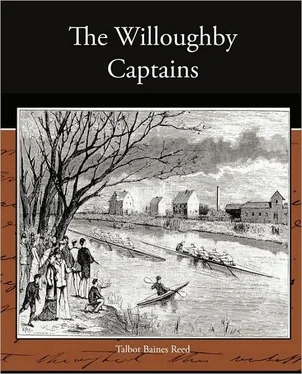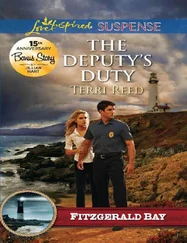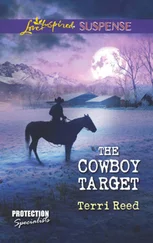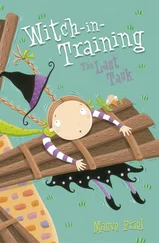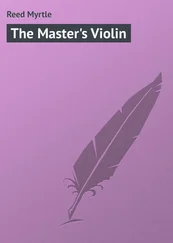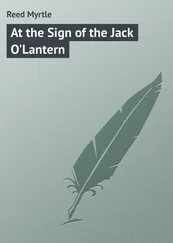At that moment King made a sudden grab at a small black book which lay on the mantelpiece.
“Oh, you fellows,” cried he, “here’s a lark. Here’s his diary.”
A mighty Whig cheer followed the discovery, amidst which Bosher’s wild protests and entreaties were quite drowned.
“His diary!” exclaimed Parson. “That’ll show if he’s a Radical or not. Hand it over, King. That’ll show up his jolly gross conduct, eh?”
“No, no!” cried Bosher. “Give it up, you fellows; it’s mine. Don’t be cads, I say; it’s private.” And he made a wild dash for his treasure.
But it was no use. Parson gravely addressed his prisoner.
“Look here, young Bosher, it’s no use making a row. We must look at the diary to see if you’re really a Radical or not. It’s our painful duty, so you’d better be quiet. We’re sorry to have to do it, you know, but it can’t be helped. If we find nothing Radical in the diary we’ll let you off.”
It was no use protesting, and poor Bosher had to submit with the best grace he could to hear his inmost thoughts read out in public.
“Here, Telson, old man,” said Parson, “you read it. Speak out, mind. Better go backwards; start at yesterday.”
Telson took the precious volume solemnly and began, frequently interrupted by the protests of the author, and more frequently by the laughter of his audience.
“‘Thursday, the 4th day of the week.’” (“I always thought it was the fifth,” observed Cusack). — “Rose at 6:13. Time forbad to shave down in the Big. N.B. — The world is big, I am small in the world, I sawest Riddell who is now in Welch’s playing cricket with the little boys. Pilbury sported too, ugly in the face. (Here all but Pilbury seemed greatly amused.) Also Cusack, who thinks a great deal,”—(“Hear, hear,” from Cusack)—“about himself. (Laughter.) I attend an election at 10:2 in the Big. Parson taketh the chair. Parson is a f — l and two between.”
“Oh!” broke in the outraged Parson. “I knew he was a Radical cad. All right, Bosher, my boy; you’ll catch it! Steam away, Telson!”
“‘It was a gross meeting, Pringle being much stuck-up. He maketh a speech. Meditations while Pringle is making a speech. The grass is very green. (Great laughter at Pringle’s expense.) I will aspire up Telson thinketh he is much, but thou ist not oh, Telson, much at all I spoke boldly and to the point. I am the Radical.’”
“There you are!” exclaimed Parson, triumphantly: “didn’t I tell you so? Bosher! What do you mean by telling such howling crams, Bosher?”
“I only meant—”
“Shut up! Fire away, Telson!”
“‘I am the Radical. I desire to smash everything the little Welchers make noises. Meditations: let me be noble dinner at 3:1 stew. The turnips are gross. I request leave of Riddell to go to the town to-morrow but he sayeth no. I am roused’—that’s all of yesterday.”
“About enough too!” exclaimed the wrathful Parson. “Just read the day before, before we start hiding him.”
“Oh, please don’t lick me!” cried the unhappy author: “I’ll apologise, you know, Parson, Telson; please don’t!”
“‘Wednesday — rose at 8:13. Sang as I shaved the Vicar of Bray. I shall now describe my fellows which are all ugly and gross. Parson is the worst.’”
“Eh?” exclaimed the wrathful owner of that name.
“‘Parson is the worst,’” read Telson, with evident glee, “‘and — and—’ oh, let’s see,” he added, hurriedly turning over the page.
“No, no; read fair; do you hear?” cried Parson. “No skipping.”
“I’ll crack your skull, Bosher,” said Telson, indignantly, handing the diary across to Parson and pointing to the passage.
“‘—And Telson is the most conceited ignorant schoolhouse frog I ever saw at breakfast got thirty lines for gross conduct with the abominable King.’”
“There!” exclaimed Telson, in a red heat; “what does he mean by it? Of course, I don’t care for myself; it’s about the schoolhouse.”
“What’s that he says about me?” said King.
“‘The abominable King,’” cried Telson, reading with great relish; “‘thirty lines for gross conduct with the abominable King.’”
“Oh, I say, this is too much, you fellows,” cried King.
“Not a bit too much. Just finish that day, Telson,” said Parson, handing back the diary.
“Please give it up,” pleaded Bosher, but he was immediately sat upon by his outraged companions, and forced to listen to the rest of the chronicle.
“‘Wyndham hath not found his knife. I grieve for Wyndham thinking Cusack and the little Welchers to be the thiefs. I smile when Cusack goes to prison in the Parliament a gross speech is made by Riddell I reply in noble speech for the Radicals.’”
“That’ll do, that’s enough; he is a Radical then; he says so himself!” cried Telson, shutting up the book, and flinging it across the room at Bosher, who was standing near the door and just dodged it in time. A regular scramble ensued to secure the “gross” volume, in the midst of which the unhappy author, seeing his chance, slipped from the room, and bolted for his life down the passage.
His persecutors did not trouble to pursue him, and a sudden rumour shortly afterwards that Mr Parrett was prowling about sent Telson and the few Welchers slinking back to their quarters. And so ended the eve of the great election.
The next morning Riddell and those interested in the discipline of the school were surprised to see that the excitement was apparently abated, instead of, as might have been expected, increased. The attendance at morning chapel and call-over was most punctual, and between breakfast and first school only two boys came to him to ask for permits to go into town. One of these was young Wyndham, whom Riddell had seen very little of since leaving the schoolhouse.
Wyndham’s desire to go down into town had, as it happened, no connection at all with the election. He was as much interested in that, of course, as the rest of Willoughby, but the reason he wanted to go to Shellport this afternoon was to see an old home chum of his, from whom he had just heard that he would be passing in the train through Shellport that afternoon.
Great, therefore, was his disappointment when Riddell told him that no permits were allowed that afternoon.
“What?” exclaimed the boy. “I’ve not seen Evans for a year, and he’ll think it so awfully low, after writing to me, if I don’t show up at the station.”
“I’m awfully sorry, Wyndham,” said Riddell, who had heard so many wild pretexts for getting leave during the last two days that he even doubted how far Wyndham’s might be true or not; “the doctor says no one is to go down, and I can’t give any permits.”
“But I tell you all I want is to see Evans — there’s no harm in that.”
“Of course not, and you should get the permit at once if any were allowed.”
“You could give me one if you chose.”
“But if I gave to one I should have to give to all.”
“I don’t see that you need tell everybody,” said Wyndham, nettled.
“I’m sorry it can’t be done, Wyndham; I can’t make any exceptions,” said the captain, firmly.
“You could well enough if you chose,” said Wyndham, sorely disappointed and aggrieved. “The fact is, I don’t know why, I believe you’ve got a spite against me of late.”
“You know I haven’t, Wyndham,” said Riddell, kindly.
Wyndham did know, and at any other time would have felt reproached by the consciousness of his own injustice. But he was just now so bitterly disappointed that he smothered every other feeling, and answered angrily, “Yes, you have, and I don’t care if you have; I suppose it’s because I’m friends with Silk. I can tell you Silk’s a good deal more brickish to me than you are!”
Читать дальше
